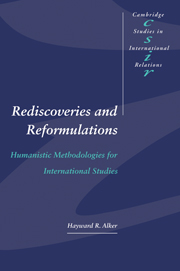Book contents
- Frontmatter
- Contents
- List of figures
- List of tables
- Acknowledgments
- Introduction: Voyages of rediscovery
- Part I Recovering Western antiquity
- Part II The humanistic science of the modern classics
- Part III Contemporary humanistic reformulations
- 8 Fairy tales, tragedies and world histories: Testable structuralist interpretations
- 9 Beneath Tit-for-Tat: The contest of political economy fairy tales within SPD protocols
- 10 Emancipatory empiricism: Toward the renewal of empirical peace research
- 11 The presumption of anarchy in world politics: On recovering the historicity of world society
- 12 The return of practical reason to international theory
- References
- Index
- CAMBRIDGE STUDIES IN INTERNATIONAL RELATIONS
10 - Emancipatory empiricism: Toward the renewal of empirical peace research
Published online by Cambridge University Press: 13 January 2010
- Frontmatter
- Contents
- List of figures
- List of tables
- Acknowledgments
- Introduction: Voyages of rediscovery
- Part I Recovering Western antiquity
- Part II The humanistic science of the modern classics
- Part III Contemporary humanistic reformulations
- 8 Fairy tales, tragedies and world histories: Testable structuralist interpretations
- 9 Beneath Tit-for-Tat: The contest of political economy fairy tales within SPD protocols
- 10 Emancipatory empiricism: Toward the renewal of empirical peace research
- 11 The presumption of anarchy in world politics: On recovering the historicity of world society
- 12 The return of practical reason to international theory
- References
- Index
- CAMBRIDGE STUDIES IN INTERNATIONAL RELATIONS
Summary
Harold Guetzkow has long cautioned against empirical peace research becoming too “data bound.” Without claiming to have captured exactly his intentions, I wish to develop the positive side of this injunction. How, then, can we recognize the actualities in our data without hiding the underlying, more or less just and peaceful possibilities? Assuming that there are various truths in our data, are there ways to find those special truths that can help unbind us, make us free – from past falsehoods, possibility-distorting representations, continuing oppressions, even war itself? In this chapter, I shall answer these questions in terms of a research orientation I call “emancipatory empiricism.” Although this research orientation is more general than peace research itself, I shall argue that it fits peace research well because the latter's disciplinary distinctiveness derives from an emancipatory knowledge interest.
One can conceptualize social scientific research orientations in general, and peace research in particular, at three increasingly comprehensive and concrete levels:
ontology – their (metaphysical) doctrines of being – reality, actuality, necessity and possibility in the realms of human action and experience;
epistemology – their philosophies of scientific knowledge generation and the methodologies (applied epistemologies) developed for discerning the real;
disciplinarity – the institutionalized disciplinary matrices (including research sponsors, professional organizations, research programs and knowledge interests) guiding research, teaching and applications of a field of knowledge.
After some orientational remarks about the relevance of its emancipatory knowledge interest for peace research's distinctive disciplinary self-understanding, I shall characterize emancipatory empiricism somewhat more generally.
- Type
- Chapter
- Information
- Rediscoveries and ReformulationsHumanistic Methodologies for International Studies, pp. 332 - 354Publisher: Cambridge University PressPrint publication year: 1996

